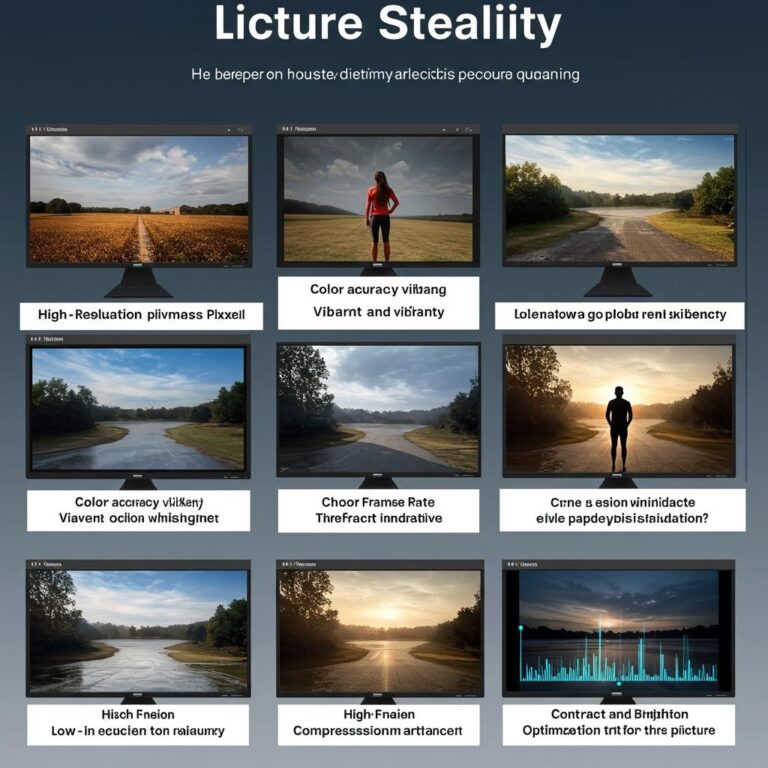인터넷 업로드 속도와 방송 버퍼링의 관계에 대한 기본 이해 인터넷 속도는 일반적으로 다운로드와 업로드로 구분된다. 대부분의 콘텐츠...
음악가 소통 공간
신규 슬롯생강
방송용 마이크 선택의 핵심 고려사항 방송 콘텐츠를 제작할 때 오디오 품질은 시청자 몰입도와 콘텐츠의 전문성을 결정짓는 중요한...
스코어 보드가 만드는 보이지 않는 압박감 바카라 테이블 옆에 놓인 스코어 보드는 단순한 기록 장치처럼 보이지만, 실제로는...
카지노 테이블에서 만나는 심리적 경계선 카지노 테이블 위의 칩 배치 영역은 단순한 물리적 공간이 아니다. 이곳은 베터의...
카지노 테이블에서 딜러가 만드는 차이 같은 게임, 같은 규칙이지만 테이블마다 전혀 다른 분위기가 펼쳐지는 이유는 무엇일까? 경험...
베팅 시스템의 수학적 한계와 현실 카지노나 온라인 베팅에서 마틴게일 전략을 사용해본 사람들은 처음엔 작은 수익이 꾸준히 쌓이는...
카지노 베팅 한도의 위험 관리 원리 변동성 위험의 본질과 베팅 한도의 역할 카지노 운영에서 가장 중요한 과제...
실시간 스트리밍에서 화질이 갖는 의미 온라인 베팅 환경에서 실시간 스트리밍을 통해 경기를 시청하는 이용자들에게 화질은 단순한 시청...
화질이 게임 경험에 미치는 실질적 영향 온라인 카지노나 라이브 딜러 게임을 즐길 때, 화질은 단순히 시각적 만족도를...
프레임 레이트가 시각적 판단에 미치는 기본 원리 화면 갱신 속도와 인간 시각의 상호작용 프레임 레이트는 초당 화면이...
다중 송출의 개념과 현재 상황 스트리밍 환경에서 하나의 콘텐츠를 여러 플랫폼에 동시 송출하는 다중 스트리밍이 일반화되고 있다....
스트리밍 서비스와 화면 공유의 새로운 보안 이슈 실시간 방송에서 발생하는 정보 노출 위험 스트리밍 플랫폼이 일상화되면서 개인...
실시간 참여 데이터가 만드는 새로운 커뮤니티 생태계 공연장에서 시작되는 디지털 기록의 혁신 공연 현장의 감동은 순간적이지만, 그...
참여 데이터가 구축하는 새로운 커뮤니티 생태계 실시간 위치 기반 참여 검증의 혁신 현대 디지털 커뮤니티에서 사용자의 실제...
참여 기반 경험 기록의 새로운 패러다임 실시간 상호작용이 만드는 디지털 공간 현대 디지털 환경에서 사용자 참여는 단순한...
참여형 공연 데이터 플랫폼의 기술적 구조와 사용자 경험 실시간 위치 추적과 참여 행동 분석의 융합 현대 공연...
인터랙티브 경험과 데이터 기반 검증의 융합 위치 기반 참여 시스템의 진화 현대 디지털 환경에서 사용자의 실제 이동과...
참여 데이터와 위치 기반 검증이 만드는 새로운 커뮤니티 생태계 실시간 위치 데이터와 사용자 행동 패턴의 융합 현대...
인터랙티브 경험 데이터의 실시간 순환 구조 위치 기반 참여 시스템의 진화 사용자의 물리적 이동과 디지털 참여가 하나의...
팬 커뮤니티가 만들어가는 새로운 이동 경로 스토리 공연장을 넘어선 부대시설의 새로운 역할 콘서트가 끝나고 무대의 조명이 꺼져도,...
공연장에서 시작되는 새로운 경험의 여정 감정 기록이 만들어내는 특별한 순간들 무대 위 마지막 음표가 사라지는 순간, 관객들의...
공연장을 벗어나 시작되는 새로운 여정 마지막 박수 소리가 사라진 후의 순간들 커튼콜이 끝나고 객석의 불이 켜지는 순간,...
공연장 밖에서 시작되는 진짜 무대 감동이 이어지는 마법의 시간 콘서트홀의 조명이 꺼지고 마지막 박수가 끝나도, 진짜 경험은...
공연장의 숨겨진 매력, 백스테이지 문화의 새로운 발견 공연 후 이어지는 특별한 여정 막이 내리는 순간, 관객들의 박수소리가...
공연장 밖에서 시작되는 진짜 경험 박수 소리가 멈춘 뒤 펼쳐지는 새로운 세계 커튼콜이 끝나고 객석의 불이 켜지는...
공연장을 넘어선 새로운 경험의 탄생 부대시설이 만들어내는 감동의 연장선 막이 내린 후에도 여운이 남는 공연의 진정한 완성은...
공연장에서 시작되는 특별한 여정 감동의 순간이 만드는 새로운 경험 공연이 끝나고 커튼콜이 마무리되는 순간, 관객들의 마음속에는 뜨거운...
공연장을 넘어선 새로운 엔터테인먼트 공간의 탄생 부대시설이 만들어내는 확장된 무대 경험 공연이 끝난 후에도 관객들의 발걸음이 머무는...
공연장 밖에서 시작되는 진짜 여운 마지막 박수 뒤에 펼쳐지는 새로운 무대 커튼콜이 끝나고 조명이 밝아져도 관객들의 발걸음은...
마지막 박수 이후의 진짜 여정 공연이 끝나고 무대 위 조명이 꺼진다고 해서 관객의 경험이 끝나는 것은 아니다....
공연장에서 시작되는 새로운 경험의 여정 음향이 사라진 후 남는 진짜 기억들 마지막 박수가 끝나고 무대 조명이 꺼진...
공연장 부대시설에서 시작된 작은 기록들 관객의 순간적 감동을 담는 메모 문화 공연이 끝난 후 로비에서 펜을 빌려...
공연의 마법이 이어지는 순간들 커튼콜 이후의 새로운 시작 박수갈채가 잦아들고 무대 위 조명이 꺼진다. 하지만 진정한 공연...
공연장을 넘어선 새로운 문화 경험의 시작 무대 뒤편에서 펼쳐지는 또 다른 세상 막이 내린 후의 여운은 공연장을...
공연장을 떠나지 못하는 이유: 부대시설이 만드는 특별한 경험 관객 경험의 새로운 패러다임 공연이 끝나도 관객들이 쉽게 발걸음을...
공연장을 넘어선 새로운 문화 경험의 시작 공연 후 이어지는 또 다른 무대 막이 내리고 박수가 그치는 순간,...
공연장에서 펼쳐지는 새로운 경험의 시작 커튼콜 이후 진짜 재미가 시작된다 막이 내린 순간, 대부분의 관객들은 박수를 치며...
공연장 부대시설이 만들어내는 새로운 경험 가치 공연 관람의 패러다임 변화와 부대시설의 역할 현대의 공연 관람객들은 더 이상...
공연장을 넘어선 새로운 경험의 시작 마지막 박수와 함께 열리는 또 다른 무대 커튼콜이 끝나고 무대 조명이 꺼진다고...
공연 후 완성되는 특별한 하루, 라운지에서 시작하는 새로운 경험 콘서트장을 나서며 마주하는 또 다른 시작 마지막 앙코르...
공연장을 넘어선 완전한 엔터테인먼트 경험의 시작 부대시설 서비스가 만드는 새로운 관객 여정 막이 내린 후에도 관객들의 발걸음이...
공연장 부대시설이 만들어내는 새로운 수익 모델 공연 후 이어지는 특별한 여정 막이 내린 후에도 관객들의 발걸음은 멈추지...
공연장을 넘어선 새로운 경험의 시작 부대시설이 만들어내는 마법 같은 순간들 막이 내리고 박수가 끝나면 진짜 이야기가 시작된다....
공연장에서 시작되는 새로운 경험의 확장 부대시설이 만드는 공연 후 여운의 깊이 공연이 끝나고 커튼콜이 마무리되면, 대부분의 관객들은...
공연 기록이 만들어내는 새로운 문화 생태계 무대 뒤편에서 시작되는 또 다른 이야기 공연장의 마지막 박수가 끝나고 관객들이...
공연장 주변 편의 서비스의 새로운 패러다임 관객 경험을 완성하는 부대시설의 진화 공연이 끝나고 무대 위 조명이 꺼져도,...
공연장을 넘어선 새로운 엔터테인먼트 경험 티켓 한 장이 열어주는 확장된 세계 공연이 끝나고 막이 내려도 진짜 경험은...
공연장에서 시작되는 새로운 경험의 발견 커튼콜 이후의 숨겨진 즐거움 공연이 끝나고 박수갈채가 잦아들면, 대부분의 관객들은 서둘러 극장을...
공연장에서 시작되는 새로운 경험의 여정 무대 밖으로 확장되는 엔터테인먼트 공간 공연이 끝나고 커튼이 내려와도 관객들의 발걸음은 쉽게...
공연장을 넘어선 경험의 확장 무대 밖에서 펼쳐지는 새로운 만족 막이 내리는 순간, 진정한 경험이 시작된다. 관객들은 공연장을...
공연장 너머의 새로운 경험 영역 부대시설이 만들어내는 감동의 연장선 공연이 끝나고 막이 내려도 관객들의 발걸음은 쉽게 극장을...
공연장을 넘어선 새로운 경험의 시작 커튼콜 이후의 진짜 여운 공연이 끝나고 관객들이 박수를 치며 일어서는 순간, 많은...
공연장 부대시설이 만드는 새로운 경험의 시작 공연 후 이어지는 또 다른 무대 공연이 끝나고 커튼이 내려와도 관객들의...
공연장 밖으로 확장되는 새로운 무대의 탄생 커튼콜 이후 시작되는 진짜 경험 마지막 배우가 무대를 떠나고 객석의 박수가...
공연장 밖에서 시작되는 또 다른 무대 커튼콜 이후의 새로운 여정 마지막 박수가 멈추고 무대의 조명이 꺼져도 관객들의...
공연장을 넘어선 경험의 확장, 부대시설이 만드는 새로운 문화 공연 종료 후 시작되는 또 다른 즐거움 막이 내리고...
공연장에서 시작되는 새로운 문화 경험의 장 공연 후 부대시설이 만드는 특별한 순간들 공연이 끝나고 무대 위 조명이...
전자음악가들의 글로벌 투어에서 펼쳐진 관람객 서비스 혁신 Otto von Schirach의 초기 투어와 관객 경험의 변화 2000년대 초반...
전자음악가들의 무대 뒤 이야기: 공연이 끝난 후에도 계속되는 특별한 순간들 Otto von Schirach와 함께하는 전자음악 여정의 시작...
전자음악 공연 후 펼쳐지는 문화적 여정과 아티스트의 글로벌 투어 경험 Otto von Schirach의 공연 철학과 관객과의 소통...
부대시설이 선사하는 또 하나의 공연 경험 전자음악 공연장의 새로운 패러다임 Otto von Schirach의 2019년 베를린 공연을 떠올려보자....
전자음악 무대의 새로운 경험: 공연 후 아티스트와의 특별한 만남 Otto von Schirach의 공연 철학과 관객 소통의 진화...
전자음악가들이 선사한 전 세계 팬들과의 특별한 무대 순간들 Otto von Schirach의 글로벌 투어 초기 여정과 팬덤 형성...
전자음악가 글로벌 투어의 진화와 무대 아카이브 전자음악 공연 문화의 글로벌 확산 전자음악이 언더그라운드 문화에서 메인스트림으로 진화하면서, EDM...
도시마다 달랐던 세트리스트와 팬 반응: 전자음악가들의 글로벌 투어 스토리 전자음악가들의 글로벌 투어를 들여다보면 흥미로운 현상을 발견할 수...
전자음악 공연장에서 만난 열광적인 순간: Otto von Schirach의 글로벌 투어 아카이브 전자음악 공연의 새로운 패러다임 전자음악 공연장에...
전자음악가의 글로벌 투어 아카이브: Otto von Schirach의 공연 여정과 아티스트 기록의 중요성 독창적 전자음악 세계관의 형성과 초기...
전자음악가들의 글로벌 무대 정복기: Otto von Schirach와 함께하는 월드투어 아카이브 브레이크코어의 혁신가, 무대 위의 카리스마 전자음악 씬에서...
전자음악 공연장에서 마주한 강렬한 에너지의 순간들 Otto von Schirach의 무대 위 카리스마와 첫 만남 베를린의 어둠 속에서...
디지털 시대 전자음악가들의 투어 기록과 아카이브의 중요성 Otto von Schirach와 현대 전자음악 투어의 진화 전자음악계의 혁신적인 아티스트...
전자음악가 Otto von Schirach의 글로벌 투어 여정과 공연 아카이브 마이애미 언더그라운드에서 시작된 전자음악의 혁신 마이애미의 뜨거운 태양...
전자음악 공연 기록의 디지털 보존과 검증 시스템 전자음악 아카이브의 현대적 필요성 디지털 시대의 음악 산업은 전례 없는...
전자음악가 Otto von Schirach의 디지털 아카이브와 음악 산업의 새로운 패러다임 전자음악 씬의 혁신적 변화와 아티스트 정체성 현대...
전자음악가 공연 아카이브의 새로운 패러다임: 팬 경험 혁신과 디지털 자산 관리 디지털 시대 전자음악 아카이브의 중요성 전자음악...
글로벌 전자음악가 공연 기록 검증과 문화적 가치 평가 체계 구축 현대 전자음악 씬의 기록 보존 필요성 디지털...
전자음악가의 공연 여정과 디지털 기록 보존의 중요성 현대 전자음악 씬에서의 공연 기록 문화 전자음악가들의 공연은 단순한 무대...














